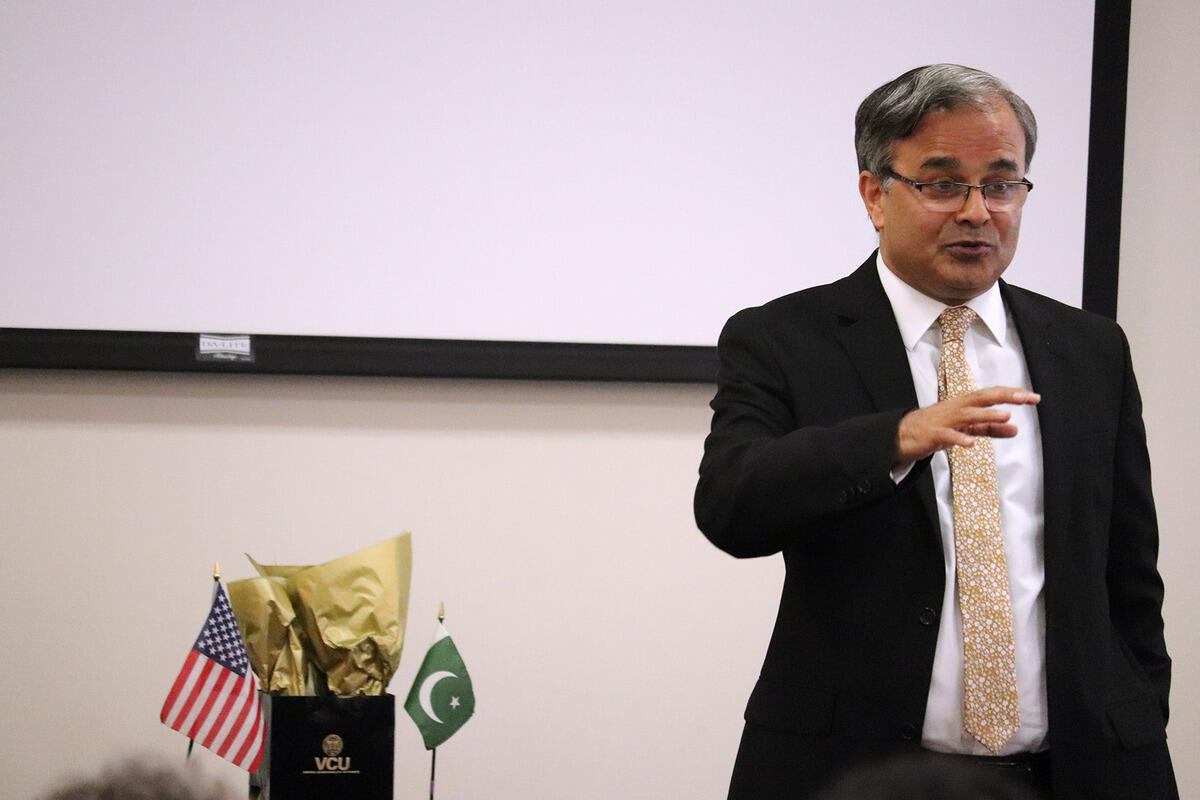
Oct. 15, 2019
At VCU, ambassador says Pakistan faces challenging connections with neighbors
Pakistan must balance international issues with the needs of the country’s people, said Asad Majeed Khan, Pakistan ambassador to the United States.
Share this story
Pakistan straddles a delicate relationship with its neighbors India, China, Iran and Afghanistan, said Asad Majeed Khan, Ph.D., ambassador of Pakistan, in a lecture titled “Evolving Regional Scenario - Pakistan’s Perspective,” at Virginia Commonwealth University’s West Grace North residence hall.
In his wide-ranging presentation, Khan set the stage for the audience of faculty, staff, students and community members, describing Pakistan as a young country with the world’s fifth-largest population in a “tough neighborhood,” balancing international issues with the needs of the country’s people.
“Pakistan is one of those rare countries blessed with geography,” he said at the Oct. 11 lecture co-hosted by the VCU Global Education Office and the Department of Political Science in the College of Humanities and Sciences. “We are at the cusp of three different sub-regions – that is South Asia, Central Asia, West Asia and also being on the mouth of the Persian Gulf.”
Khan said Pakistan’s strategic location gives his country heightened relevance.
“It is a security challenge between two nuclear powers [Pakistan and India], and the line of control has escalated, so that makes things tough,” he said. “On the western side is the issue of peace in Afghanistan. The approach [of Pakistan’s Prime Minister Imran Khan] was to seek peace with India and promote peace in Afghanistan. This has been this prime minister’s long-standing position, that there is no military solution to resolve the conflict in Afghanistan.”
In his talk, Khan covered terrorism, trade and diplomacy as well as current conflicts, such as Kashmir, talks with Afghanistan, and Pakistan’s relationship with the United States.
“Dr. Khan’s visit to VCU offered an extraordinary opportunity for students, faculty and community members to engage with and hear the perspective of an important figure on the global stage,” said Jill Blondin, Ph.D., executive director of the VCU Global Education Office.
Khan, who has a 29-year diplomatic career, started his post as Pakistan’s ambassador to the United States this year.
The humanitarian crisis in Kashmir is a conflict that has “come back with a vengeance,” Khan said. He explained that Pakistan Prime Minister Imran Khan’s people-centered campaign is focused on development and included outreach to India Prime Minister Narendra Modi to work together to provide a better standard of living in the region.
“Unless we have peace with our neighbors, it will not even be possible for [Pakistan’s] government to spend energy and resources on our people,” Khan said, explaining the Pakistan prime minister’s approach. “One of the first things [the prime minister] did was address the relationship with India. ‘In South Asia, we have one of the highest levels of people living under poverty. We as leaders need to fight poverty [the prime minister said to Modi]. We have had too many fights. It is time to have dialogue.’”
Khan called the Kashmir situation misleading and confusing, with India blaming Pakistan for attacks there. Pakistan, he said, is working with India to investigate issues.
“Domestic Indian politics use Pakistan as a punching bag,” he said. “We really want to start this conversation on terrorism. We have lost 70,000 people in Pakistan. Every other day there is an incident. So let’s sit down and do that.”
Khan emphasized that the conflicts in the region, such as within Afghanistan, have broad consequences.
“All the Central Asian countries have an interest in [Afghanistan],” Khan said. “We all get adversely impacted by the continuation of conflict in Afghanistan. Any conflict is going to have far-reaching implications.”
Khan stressed Pakistan’s commitment to peace regarding tensions in the Persian Gulf and efforts to avoid escalations with Iran. Addressing Pakistan’s bilateral relationship with the United States, he recounted the connection between the countries, as well their deep and often positive relationship.
”When we work together we receive the highest results,” he said.
Subscribe to VCU News
Subscribe to VCU News at newsletter.vcu.edu and receive a selection of stories, videos, photos, news clips and event listings in your inbox.










